-
 PoeticUniverse
1.7kOmar was born just about when the Shariah of Islamic law in Persia had begun and had prohibited philosophy, he writing mostly in secret while working for the Shah on algebra, the new calendar, and more.
PoeticUniverse
1.7kOmar was born just about when the Shariah of Islamic law in Persia had begun and had prohibited philosophy, he writing mostly in secret while working for the Shah on algebra, the new calendar, and more.
All the Omar and extensions one could ever need.
First, the best two superb, action-figured, spoken/sung videos:
The Rubaiyat of Omar Khayyam (3 parts):
Finally, everything kind of in one place!
Austin’s Golden Rubaiyat (2 parts. My own quatrains that I like the best. Upgraded to 4K.):
(to be continued) -
 PoeticUniverse
1.7kThis looks like it would be good to watch on acid. — S
PoeticUniverse
1.7kThis looks like it would be good to watch on acid. — S
Or just pot and Persia-fumes, so the colors don't come out and grab you—pulling you into your big 4K TV. -
 PoeticUniverse
1.7kThrough the Rubàiyàt, I sense enchantment,
PoeticUniverse
1.7kThrough the Rubàiyàt, I sense enchantment,
Essence distilled in the translator’s scent.
Recomposed from Khayyàm’s dust and spirit,
Potent elixirs escape interment!
— Omar Khayyam’s Times —
The Shariah (Islamic Law)
The central debate in the Islamic world
Is and has always been between
Those who support reason and discourse and those
Who rely on a strictly legal understanding of Islam.
The former is interested in dialogue
And the latter in dictating
The nature and the terms of that dialogue.
— Medhi Aminrazami
The voices of the orthodoxy gained prominence
At the court of Caliph Al-Mutiwakkil,
Who opposed intellectual debate
Concerning religious matters.
It took another century
For the orthodox theologians
To consolidate their position and to present
The legalistic and orthodox version of Islam
As the official version.
This allowed such jurists as Ahmad ibn Ḥanbal
To formally charge philosophers and theologians,
Particularly the Mu‘tazilītes, with heresy.
With freedom of expression substantially curtailed,
The spirit of rationalism was replaced
By the Ash‘arites orthodox theology,
Which emphasized faith as opposed to reason.
Omar Khayyam lived in the 12th century
When the glorious days of intellectual debate
And discursive reasoning in Persia had come to an end.
Philosophers like Fārābī, Ibn Sīnā (Avicenna),
Zakariyā Rāzī, and Bīrūnī,
All of whom were once venerated figures,
Became symbols of apostasy and heresy.
In his Kharidat al-qasr, ‘Imad al-Din Katib Isfahani
Says about Khayyam,
“There was no one like him in his own time
And he had no peer in the science
Of astronomy and philosophy”. -
 PoeticUniverse
1.7kThe FitzGerald Enigma—of Improving Omar’s Quatrains
PoeticUniverse
1.7kThe FitzGerald Enigma—of Improving Omar’s Quatrains
How is it that only Edward FitzGerald could write a superb Rubaiyat quatrain, even 115 of them (5 are from his notes), in the grand order of day into night, transmogrifying Khayyam, while no one else could/can come up with even one great one, even given that almost 159 years have gone by for so many to have done so, and with such a large Omar source reservoir? Score: Fitz: 115 World: 0.
Should we ask for one from every poet and then put them together to match FitzGerald? It seems unlikely, and even then Fitz still wins because he is only one and we are many. His first edition contained 75 quatrains right off of the bat. How is it that FitzGerald other poetic works pale in comparison to the Rubaiyat? What rarest of muses made visitation once in all of history just once for the greatest poem of all time? Should we even try to credit ‘magic’?
When Nicholas’ alternate 'wine as the divine' interpretation raised FitzGerald’s ire, causing Edward’s old fire to blaze again, 35 quatrains were added to make the second edition of 110 quatrains in the main, along with a refutation of Nicholas’ sufistic renderings in the preface. How many more quatrains might have become if Fitz’s eyesight and foresight hadn’t diminished.
Instead, to consolidate and better project the energy of the Rubaiyat, 9 quatrains were suppressed in the third edition, making for a lower total of 101, which remained so for the fourth, the intent of these new editions being also to combat the pirated editions abroad that the world devoured.
The ‘muse’ was a conjunction of many rare events, as can be seen in the the history of FitzOmar’s Rubaiyat, as written up by so many scholars. -
 PoeticUniverse
1.7kEdward FitzGerald’s Rubaiyat of Omar Khayyam stunned Victorian England soon after Darwin’s The Origin of the Species had shocked their sensibilities, but soon they and the world came to embrace what came to be known as the greatest poem in history, as well as one of the most often illustrated.
PoeticUniverse
1.7kEdward FitzGerald’s Rubaiyat of Omar Khayyam stunned Victorian England soon after Darwin’s The Origin of the Species had shocked their sensibilities, but soon they and the world came to embrace what came to be known as the greatest poem in history, as well as one of the most often illustrated.
One of the quatrains from FitzGerald’s notes doesn’t have the Rubaiyat rhyming scheme or any:
Khayyam, who stitched the tents of science,
Has fallen in grief’s furnace and been suddenly burned;
The shears of Fate have cut the tent ropes of his life,
And the broker of Hope has sold him for nothing!
So, here is my version of his tent of science/philosophy, per the three Fates implied:
Fate Lachesis threaded Khayyam’s life long,
And Omar stitched his tent’s reasoning strong,
Clotho e’er spinning his essence along;
Atropos then sheared his rope for a song.
Some of Omar's Big Questions and Paradoxes still haven’t been answered but there has been much progress therein, as well as with many revisited/revised myth-takes. -
 PoeticUniverse
1.7kMorning at the Omar Khayyam Club of America — The Living Book
PoeticUniverse
1.7kMorning at the Omar Khayyam Club of America — The Living Book
As I knock on the oaken door of the OKCA, the winds are brisk and the leaves of yesterday are swirling on down, during this part of autumn known as the ‘fall’ (of the leaves).
Autumn falls as summer leaves,
Harvesting its sum of days,
Seconding the rose of spring.
Warmth emanates from the parlor, from its chestnut paneled bookcases to the lush carpet that sinks under step like grass on a putting green. I deeply inhale the scented air installed here from Omar’s Persia-fumed grave that never fails to overwhelm.
I am at the Club early today, for an American breakfast of steak (medium-rare) and eggs (unfertilized, Swiss cheese omelet) with fruit and an apple cinnamon muffin (toasted, with butter). For dinner, later, I’ll try the leg of mutton (Persian style).
The saki pours my Iranian cranberry wine and an Arabian coffee (with french-vanilla).
Coffee plants are in the desert first seen,
By a starving outcast, who eats the bean
And finds it bitter, so he boils some, tart,
Finding that the water is the better part.
Such from asylum he returns home, quaint,
And for his coffee is declared a saint,
But its drinkers are despised by clerics—
The partakers dally over their cups!
There are many ladies about, whose presence would have perhaps dismayed the Club’s 57 originals, but that there are none of them left alive to complain.
I light up a smoke.
I note a loving couple coming in from a night in the Persian Garden of Paradise wherein the sands meet the sown.
Who knew that the twin-born Peri was bred
From lower flesh and higher spirit bled,
Where the Hellish desert meets the greensward,
When the hot sands and the luscious turf wed.
The sheer glass protective dome would be over the garden now, unnoticeable. I’ll be in there with Janice and her seven veils later this afternoon. The rose trees grafted upon from Naishapur bloom all year round.
I wave up a holographic copy of a private Rubaiyat that has only a single instance, the one illustrated by Edward Taylor Jewett, retained in the San Diego Library rare book room behind iron grates.
Jewett’s paintings in the book begin to move! It's a living book! Now perhaps you think I’m making things up about this Club’s fabulous features, in and of a hookah pipe dream, but, see more…
-
 Ciceronianus
3.1kAll this time I thought Omar actually owned a ruby yacht. If you can't trust Bullwinkle, who can you trust in these sad times?
Ciceronianus
3.1kAll this time I thought Omar actually owned a ruby yacht. If you can't trust Bullwinkle, who can you trust in these sad times? -
 PoeticUniverse
1.7kruby yacht — Ciceronianus the White
PoeticUniverse
1.7kruby yacht — Ciceronianus the White
She, Ruby Yacht, will be a character herein, at the club. It's interesting that she was named after a yacht instead of the usual naming of the boat after her. She might look in the water and see the trustful SpongeBob bobbing. -
 christian2017
1.4k
christian2017
1.4k
this is definitely a cool post. Thanks. I plan on watching until my attention span wanes out. -
 PoeticUniverse
1.7kthis is definitely a cool post. Thanks. I plan on watching until my attention span wanes out. — christian2017
PoeticUniverse
1.7kthis is definitely a cool post. Thanks. I plan on watching until my attention span wanes out. — christian2017
The OP videos are rather long, as setting the stage, but the great words, colorful art, animation, and music (even as quatrains sung) blend into a phantasmagorical experience—and there's philosophy, too. -
 PoeticUniverse
1.7kMid-Morning at the OK Club Part 1 — The Smallest Book
PoeticUniverse
1.7kMid-Morning at the OK Club Part 1 — The Smallest Book
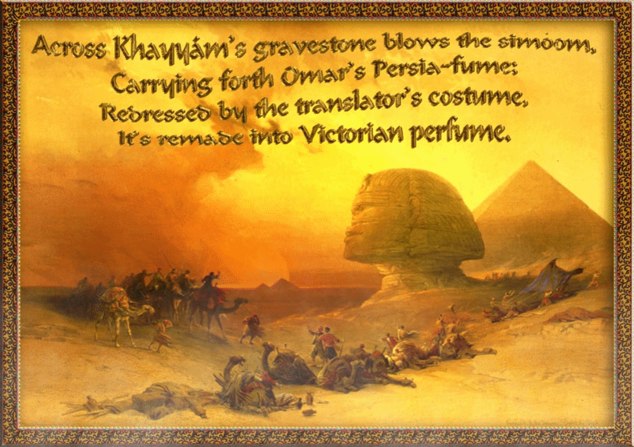
(Click to play this GIF? Let me know.)
In this continuing series, posted from the virtual OKCA Building (which anyone else could submit to), I wander about the Club, meet people, mention goings-on, refer to books, display quatrains, give a nod to the season, indulge in Omaresque musings, tie some threads together, and perhaps float on apparent flights of fancy—some of which hopes, wishes, and projections may even be real or at least eventually actualize.
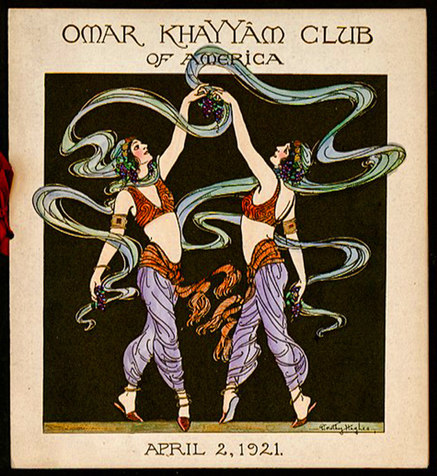
The Rubaiyat Quatrain Poetic Form
The verses beat the same, in measured chime.
Lines one-two set the stage; one-two-four rhyme.
Verse three’s the pivot around which thought turns;
Line four delivers the sting, just in time.
At 10 AM each day, a different Rubaiyat song softly plays throughout the Club a few times, and today’s is a Dylan-like rendition by Michel Montecrossa, called ‘Calm Beauty’, consisting of several Rubaiyat quatrains. Note that a few obscure words have been changed/bettered for singing/understanding.
https://www.youtube.com/watch?v=5DITr464OOQ
The playing of a song is the signal to Martin at the bar to supply from his Mixology book a special free drink of the day to all comers, served in a gold and silver chalice.
My good friend, Ohow Dryiam, an Omarian scholar from Flunck University, East Carolina, arrives, and comes over, holding out his hand, saying, “You’ll hardly believe what I have right here: the tiniest book ever made, and it's a Rubaiyat, crafted in the very early 1900s!”
I don’t see anything but a ring on his finger. “Don’t tell me it’s so small that it’s invisible, written by lining up atoms, such as IBM did with its logo, in 1989?”
“No, they couldn’t do that way back then. It took seven months to make. Look closer.”
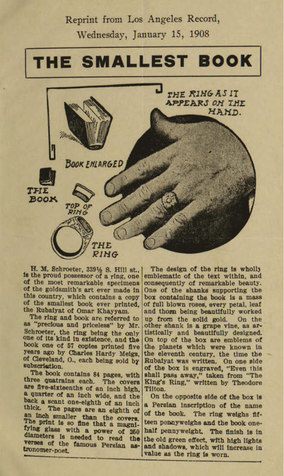
-
 PoeticUniverse
1.7kMid-Morning at the OK Club — Part 2
PoeticUniverse
1.7kMid-Morning at the OK Club — Part 2
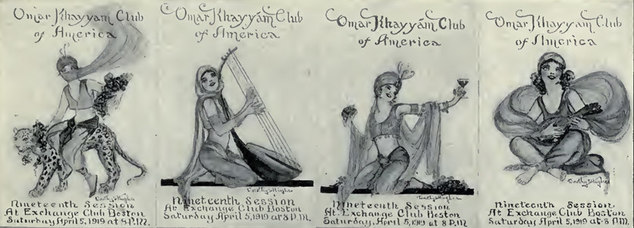
My reverie took flight, with autumn’s sight,
For I was abstracted, entranced, and light.
I beamed to the site suffused with insight:
The solutions are deep within the mind,
Reachable by dreams of the lucid kind.
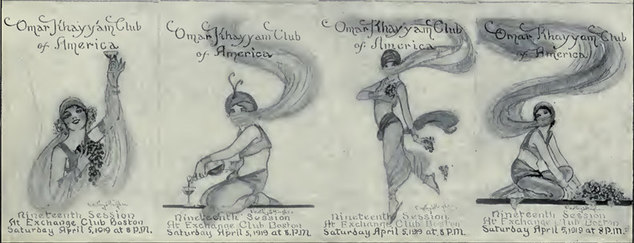
While I am listening to Afsoon Elmy’s CD of FitzOmar’s quatrains singing, a poetess/songstress, Ima Beloved, arrives, and offers me a walk outside into the warming autumnal haze. We take off and stroll afar through the countryside, scuffling through the leaves.
The weed flowers came, marking autumn’s track,
The blossoms that almost brought the spring back.
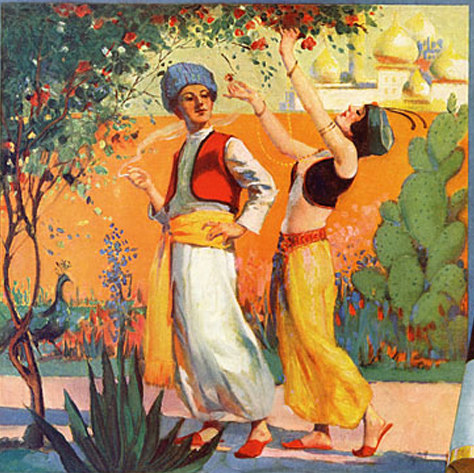
She says, “Here’s a wide log; let us sit on it to rest a while,” then hums the Pachelbel Canon, mild, adding words to it from a poem that we know, thereby creating a song, music through and thru! It goes something like: Then, where and when will we touch again…”
“Why do people take to songs so heartily?” I ask.
“Because songs can touch one’s spirit truly, so very deeply and thoroughly.”
“But how? Why?”
“There are wordless rhythms in what we call the ‘soul’. Poetry, in a rather approximate way, I’m told, attempts to translate the soul’s rhythms into words. Melody, on the other hand, being already wordless, plays directly on the heart’s strings. A song, being a poem set to music, sings, and thus causes heart and soul to ring and blend into one unified and glorious experience.”
“Yes, and it all seems to flow so smoothly. And, by the way, your words of prose seem to both rhyme and sing, my dear.”
“Music, like life, consists of the ‘what-how’ of what I would call a ‘smoothly rolling now’.”
“I feel that I know your meaning, but, please explain the further seaming seeming.”
“Well, the total effect of music comes from, I’m sure, the smooth transition through past, present, and future, this, thanks to a correspondence rationed, in memory, sensation, and imagination. Memory recalls the past few musical tones that have come just before the ‘now’ that we own; sensation lives ever in the ‘now’ as known, and therefore it savors the present tones; imagination looks to the future rounds, anticipating the coming sounds.”
“Ah, I get it, and it’s poetic. The delight in such as is known is as none of the three could produce alone!”
“Yes, that’s it, my man, as you’re a poet, too, a fine conclusion, and similarly, there is a life award: for each one of life’s moment’s words contains eternal reward, since both past and the future are smoothly rolled up thereinward.”
“We live in the paradisal ‘now’, at last, wherein each moment is eternally vast,” I state, poetically.
“Now, let us consider the quatrain,” she says, “for it can encapsulate and condense a lot of wordiness into something more succinct, as like a pearl produced from an oyster’s digestion—please excuse me for that last part.”
I write, juggling the words and the rhyme sound, after having to end up using 12 syllable lines:
Memory’s ideas recall the last heard tone;
Sensation savors what is presently known;
Imagination anticipates coming sounds;
The delight is such that none could produce alone.

(Ima’s winter garment of repentance thrown off in the spring)
(Click on the GIF image above to run it.) -
 PoeticUniverse
1.7kMid-Morning at the OK Club — Part 2a — Rubaiyat II
PoeticUniverse
1.7kMid-Morning at the OK Club — Part 2a — Rubaiyat II
My dream becomes to write a sequel to the Rubaiyat…
Preface
مقدمه
The light of Omar Khayyam shines again, in this epic successor to the FitzOmar Rubaiyat, via Omar’s quatrain conversations with his Beloved female, the Moon of his Delight who know’st no wane, as they wander far from the noise of politics, wars, and mosques, in and about enchanting forests, on green-grassed river banks, through fabulous gardens, and up and down the Djinn mountains, whilst in between they haunt the taverns and therein engage in philosophical and religious discussions.
In Naishàpùr, Persia, rose gardens sing,
Then shed their blossoms at the end of spring.
Likewise, Old Khayyàm’s Earthly splendor flew,
Yet, his Bird of Time still lives, on the wing.
The fumes of ageless rhymes from ancient times
Waft from the Persian verse, as some chimes
New are mixed with the spirit of the old,
Deftly rendered for Victorian climes.
Across Khayyàm’s gravestone blows the simoom,
Carrying forth Omar’s Persia-fume.
Redressed in the versifier’s costume,
It’s remade into Victorian perfume.
In his flowered bed, Omar reposes,
Resting in the earth in peace, one supposes;
Yet, beneath these words and themes on roses
In my quatrain-poems, Old Khayyàm composes.
Foreword
مقدمه
Rubaiyat II is an illustrated epic poem, ideally to be read slowly and thus savored in the now of its present tense. It is a sequel, yes, but it is extended, and thus more in depth, expanding on themes that were just touched upon or implied in the FitzOmar Rubaiyat.
Omar and his Beloved finally appear after about 25 pages of Persian background descriptive quatrains. Later on, it takes them about 16 quatrains just to wake up. They ever speak in quatrains, and the ongoing conversations, sometimes with others, dominate the remainder of the work. They’ve returned to life, via djinn, and science and philosophy have progressed over the years, yet still in the way as ever first identified by Khayyam.
This back and forth method of quatrain dialog, along with the continuity from similar subject matter within a particular time of day, serves to energize the work by weaving a continuous story. Also, the topics versus their illustrations play off each other, this synergy spiraling into added resonance.
There are 4 main sections, in 6 hour periods, of the day’s 24, midnight to morning, morning to noon, noon to evening, and evening to midnight, these roughly corresponding to youth, young age, middle age, and old age, as well as to the seasons of spring, summer, autumn, and winter.
The 3000+ quatrains are mostly my own, as inspired by Omar or by themes I’ve reflected on, but for about 134 public domain translated quatrains from the Calcutta manuscript or from Whinefield, retransmoggrified, and about 186 quatrains contributed by Positor. Most of my 158 retransmogrified Bodliean manuscript quatrains appear. I have also derived about 17 quatrains from Gallienne’s fine prose. These uses are cited in the Appendix.
The longest sections are the evening tavern talk sessions, way later on. Well before that, and throughout, Omar and his Beloved discuss similar Rubaiyat universal topics while here, there, and about. Yes, I have been overwhelmingly overtaken by the Persia-fumes.
Some other long sections are of the olden folklore of the language of the flowers and of the otherworld, peri/pari (fairy-djinn) realm of Omar’s djinni Beloved, as well as several particular philosophies expounded upon. Take heart, for though they may be extensive, they are beautiful and flowing to read.
There is also much of Omar and Beloved enjoying the glorious nature of the wilderness, as well as ever-present romance, mystery, metaphysics, thinking, drinking, and adventure, which the ideal for a far reaching epic.
I’ve drawn from just about everything that I’d ever thought of in life, as well as some new ideas, and so this, probably being my last long book, is the only book of summary that I’ll ever need.
The illustrations were made in Poser, DAZ3D, and iclone, all of which applications allow the user to own whatever is produced. Not all the illustrations can be embedded herein, but can be seen in videos.
Such it begins in earnest:
0.
PROLOG
پرولگ
(0. 1 q1-8)
1
— The Persian Climate and the Poetic Temperament —
هویت ایرانی و احساسات شعری
Persian life simplifies to the extremes,
Loving or fierce, to have or not the means,
Twin Genii granting the best and the worst—
Beyond the Sultan’s favor and Fate’s gleams.
The subsistence aplenty engendered
By the sun’s bounty and breezes rendered
Contrasts to the simoom, the plague, the wars,
The mirage, and the beasts endangered.
Desert life hangs by a skin of water—
In a realm so large to die no better
From a freeze in the north to suffocate
From the heat in the south, weather-whether.
The Patience Stone is the most empathetic
Of listeners, absorbing into it
The pains and sorrows of the one telling.
When it’s full of ache it bursts into bits.
Temper’s all poetry and religion,
And there are but two days distinction—
The Day of the Lot—origination,
And the Day of Judgement—destination.
A-tween, inexorable Destiny
Weaves life’s braided wave, warp, and woof, Sufi,
Whose virtue is courage and submission
To what has been appointed so surely.
Exquisitely pleasured by poetry,
The sense excites beyond rein, dearly,
Through verses chanted, that drive the fearless—
Then grant reward, returned from victory.
Verse exhilaration bests the grapevine,
For quatrains and couplets exceed fine wine.
Flowers and tenders are as drink-spirits,
With the rose gleam a dram of hashish shine.
(0. 1 q9-16)
Poetry dresses the phantasmic new
By enshrining the apparitional brew,
Captured and bottled as aqua-vita—
Wisdom’s pearls, from the evanescent dew.
The Persian pearls bear the down of the lip,
The mole on the cheek, the eyelash, tulips,
Lilies, roses, jasmines, pearls, musk, birds, song—
Epigrammatic, and often epic.
The cedar, the cypress, the palm, the olive,
The willow, and fig-tree, and birds therein,
Are ne’er wanting in the musky verses,
Nor the flower legends, as well as wind.
What’s pent and smouldered as the numb and dumb
Is not spent in the poet, but from a crumb
Rises and grows over into new form,
As relief, in creation through the plumb.
Of a keen bodily sense with sensation,
With a deep intellectual passion,
Poets wing far between Heaven and Earth—
As delight in the two’s composition.
A snatch of poem the camel-driver sings,
And paints with sun-beams what his vision brings—
Of the waving veils adorning the tent,
Of the pipe-dreams floating up in smoke rings…
Which fumes are as sighs sent to Heaven far,
For consideration, from his altar
On this bubbled puff of a worldly sphere,
In case Destiny wishes to shake its jar.
The fence is a temptation for a flout,
But souls are the breezes that have no route.
Were that I was her soft breath in and out,
I could e’er on my way kiss her lips’ pout.
-
 fresco
577To Poetic Universe
fresco
577To Poetic Universe
This is a very stimulating project which has prompted me to research Omar Khayyam. Congratulations are in order for your efforts to embellish the opus (not all of which is attributable to Omar anyway !) .
It may be the case that the Zeitgeist of popularity for this work has passed, such that the semantic backcloth required for its interpretation has become obscure for the average reader. In philosophical terms, we are then perhaps left with the more general issues surrounding 'word magic', which can involve a multitude of angles including, prayer, hypnosis, poetry, oratory...and perhaps culminating in adages like ' Language speaks the Man' (Heidegger), or 'The limits of my language are the limits of my world' (Wittgenstein). -
 PoeticUniverse
1.7k'word magic' — fresco
PoeticUniverse
1.7k'word magic' — fresco
FitzGerald the transmogrifier brought forth Omar's Arabic into Victorian English so exquisitely that most of the world had to obtain a copy of his version of the Rubaiyat, and over the other poets and literalists. His other works of literature paled in comparison to the magnificence of his book of quatrains.
— The Book of Quatrains —
Now, for the golden verse, as the first.
For its olden age, it is none the worse.
Although day-tide has just barely spoken,
I no less will open our precious token,
This mystery book of poetry sealed,
With waxen shield, it having been concealed
For hundreds of years in the secret chamber
Of the old library’s remainder.
Ope it as one would a tender lover.
A bottle’s encased inside the cover.
Its spirit’s mist apparently escaped
As our fuminous volume was undraped.
I’m captivated by the Persia fumes.
As I. It’s the perfume of ageless rhymes,
From those grand, learnéd Sufi looms of time.
We’ll have to learn how to read between the lines.
The tome is written in foreign language,
In fine verses of thirteen syllables,
Epigrammatic, in four-line stanzas,
It having many swirlas and circulas.
It’s written in middle Persian, I’ve looked,
Having handled many such foreign books—
My editor’s role in the abbey’s nooks;
I thought to hide it in one of the rooks.
The library’s most valuable book!
For I’ve illuminated and unhooked
Many of the monastery’s great books.
For it a long and joyous month I took.
It was the only writing I could save,
Yet it’s the only book we’ll ever crave.
— The Transmogrification —
They watch the book moving about, amazed;
Sparkles and twirls whirl out of the pages.
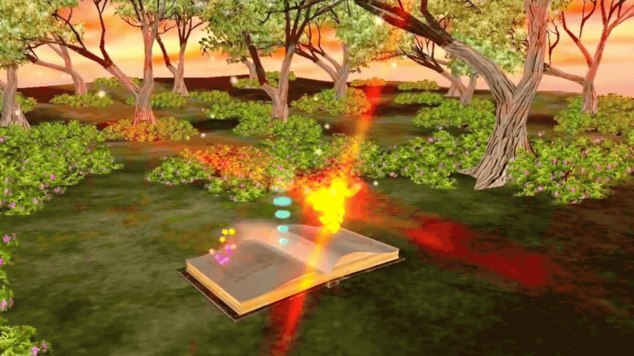
(Click to run the GIF)
It’s rising, breathing, and coming to life,
As husband in the presence of his wife.
Words bounce around; over the page they run,
They often changing into English ones.
Even whole verses are now roundly dancing—
Of the Arabic world—dervishes whirling.
They’re trying to settle from the struggle,
But the words do again jump and juggle,
Some hanging back, then ever surging forth,
Darting around through the poem’s long course,
Then make stanzas, to form a brighter source,
From aspects of the pervading concepts.
’Tis as if this transmogrification
Is trying to preserve all relation
Of the original schema throughout,
The whole translation process devout,
Including literal means, rhythm, rhyme,
Melody, syllable, meter, and time;
But this doesn’t seem to be workative,
And so it follows that something must give,
And this might well sadly be the ration
That is usually lost in translation.
See! Out of that desperation, uncaged,
The verses are jumping right off the page,
Splashing into the bottle of perfume,
Wherein they are redistilling, subsumed.
Now they’re leaping back out, onto the page,
Recomposing themselves, for this time—our age,
Whereupon they’re condensing, restaging,
Into Victorian verse, over paging—
Original concepts forming new quatrains
In which Omar’s meaning’s essence remains.
The lines are now ten English syllables,
Rather than the Arabic thirteen quills,
Yet holding even more related meanings,
Heretofore unnoted, yet the verses
Are still in groups of four lines per stanza,
And the correct lines still rhyme, per lingua,
Although some of the ending quatrain schemes
Don’t seem to have quite the same rhyming means.
Yes, only the unneeded has been lost;
A charm has been added, the good not tossed;
It is something somehow much better told,
Yet e’er within the spirit of the old. -
 PoeticUniverse
1.7kHigh Noon at the OK Club — Part 1 — Obits
PoeticUniverse
1.7kHigh Noon at the OK Club — Part 1 — Obits
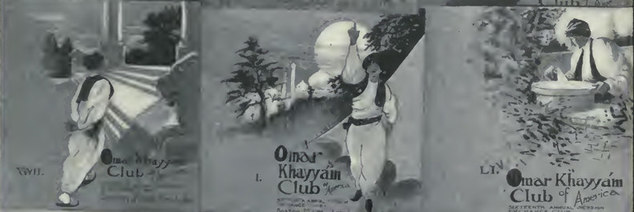
(Men on the menus!)
Should we call the above ‘Womenus’, to whet women’s appetites?
From the Halloween lunch buffet I grab some Lady Fingers, Jello worms, and then stare back at the eyeball pasta, but then choose dog Kibbles instead.
I ponder Ima’s ‘Smoothly Rolling Now’ notion that makes for our extended present and ever continuing stream of consciousness… I realize that the basis of it must be of short term memories seamlessly stitched together.
Whens
Life is a web, of whos, whys, whats, and hows
Stretched in time between eternal boughs.
Gossamer threads bear the beads that glisten,
Each moment a sequence of instant nows.
I now head to step out a back exit of the Club for a bit, with a different drink in each hand and goodies in my pockets, and pass through our Obituarium, which displays in posters our lives’ full and spirited doings, with even the future parts included of all that we’ll thereby have to live up to.
At the end of the room, there is an ornate, otherworldly type door, with a sign written in gold above that reads:
The Great Equalizer stalks all creatures made,
Lying ever just ‘round the corner in the shade,
Taking both human and the beetle as one,
After their lives are spent from rolling some dung.
The door creaks as I pass through its way and into our cemetery to look about the souls’ resting places.
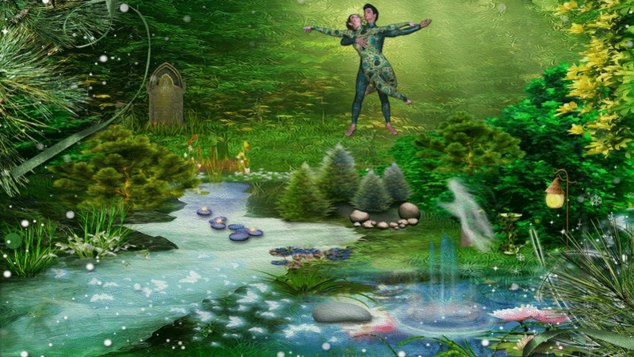
(Click to run.)
A brand new inscription appears on the main stone:
Summer passed away in his sleep last night,
Autumn, sweet and plump, carries his offspring.
The year dies in the night, ghostly winter comes—
Yet spring’s flower is already in the seed.
We’d just had our first frost, but the sun has melted it.
The smile meets the tear—
Fall’s embers last through December.
I look into the distance, noting the endless rows of tombstones in this ‘Land of Epitaphs’. I tilt my drink to pour a few drops into the grass,
Here, a few drops I pour onto the ground,
That precious drink of the quatrains profound.
It through the soil trickles and seeps…
And to his thirsty lips the way it found.
…and lift the drinks to my lips, Sipping From The Rubaiyat’s Chalice (Book by Martin Kimeldorf), then drink Mehdi Aminrazivi’s The Wine of Wisdom from my other hand.
Another epitaph catches my eye:
The Last Remembrance
Engraved is ‘The End’ of your Earthly sigh;
Six sides surround: five are dirt, one is sky.
Shov’ling, Death speaks to you at last, and says,
“What were you doing during all of nigh?”
I sit on a stone bench and paint a cemetery scene that I’ll need for another post.
Back inside, I obtain another drink and turn to the next page of the Jewett Illustrated Rubaiyat, savoring the details, it filling my entire table in its 8K 3D resolution, but I can only show it as a smaller 2D image here:
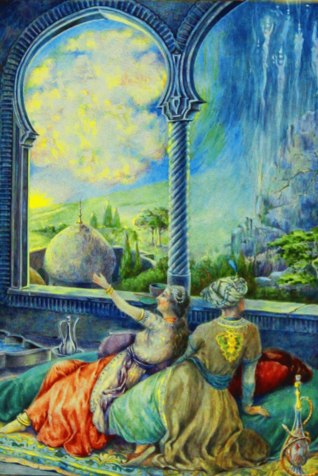
(Click to run.)
-
 PoeticUniverse
1.7kHigh Noon at the OK Corral – Part 2 — Toasting Death
PoeticUniverse
1.7kHigh Noon at the OK Corral – Part 2 — Toasting Death
Chrysanthemums drink the mellow day;
Falling petals carry the light away.
The autumn fog enswirls, the mist upcurls;
Into nothingness the wisp slow unfurls.
I see Danton walking by, but I remain quiet, for he is not exactly acting exuberant.
Danton O’Day had been using our quantum tunnel portal chamber to transport himself into the rare book rooms of our Partner Libraries, some of which had over 4000 Rubaiyats, in order to hopefully quickly finish his search for a few missing artists of the Rubaiyat for his next series, covering thee illustrations from 1914-1929, by checking there personally in the rare book rooms if perhaps the cataloging had been wrong or incomplete, with the book actually sitting there on the shelves somewhere, or behind, or even lying on the floor.
If not, then the only hope was the posted appeal to the public, especially to collectors, in case they had a copy.
If still not, then some of the illustrator samples might have to be left out, after some reasonable waiting time had expired, which, for those impatient like me, would be about a week or less, for I really want to read his next series, even if it only 99.9% covers the period.
I’m not about to tell Danton to publish right away just what he has, lest he suggest in return that I cut a lot of my art from my big fat 14x11 400 page edition of The Ultimate Rubaiyat of Omar Khayyam that hit a wall when the PrestoPhoto book making place informed me that the binding might not hold up beyond 275 pages, and, to boot, that it would cost $420 to print 400 pages. Oh well, I guess a lot of ink has to be consumed.
There is still my potentially endless Apple ibook edition, now at 589 pages, which is logically even more than that, given that some of its landscape view pages contain two facing portrait style images.
Ima Beloved, my elfin muse, reappears and proposes a toast for All Soul’s Day:
A Toast to Death
Time, death, and stardust duly
Made for our birthright fully.
Death chose the useful from the useless
And the pointed from the pointless,
But it took the long of time of yore,
Since Death was the only evaluator.
Eons and ages passed in time’s acumen
For us to evolve from stardust into humans.
Time, death, and stardust’s paths
Write our epitaphs as well, just
As they writ our birthright past.
When our time expires, of the cleft,
Death will come, our living bereft,
And only our dust will be left.
She adds, “I know the poem needs to be worked on some more, plus having quatrains derive from it.” and continues…
Our minds,
Like Shelley’s prisms of many-colored glass,
Strain the white Radiance of Eternity into our lives—
Until Death tramples us—
And then back we go to stardust
After relentless time has wasted us away.
We are devoured us in order to return
That life-dream which was lent to us.
I reply, “I’ll see what I can do with it. Your musings always build into something useful. The themes are great, of course, but they have some repetition and perhaps they explain too much, one stanza might still stand alone for a quatrain, and some rhymes are too forced, plus we probably don’t really need to borrow Shelly’s interpretation, although it’s memorable in his original terms.”
She wanders off, happy to have planted another seed.
I take a short nap outside.

(Click to run.)
“I’ve got something, Ima, three quatrains. You can fiddle with them some more. I’m not completely satisfied with them, but they’re good enough for now.”
Heaven’s stars spread the primeval dust eterne;
Time’s deep seas to evolve the species in turn.
From time, death, and dust we at last became,
And to this, thus, and that we must return.
Time and stardust made us Earth’s living guest,
For quick death sifted the rest from the best.
Those, our birthright, wrote our epitaph, too:
RIP; time expired, death came, dust was left.
Death, evolution’s lone selector,
Stalked the sillier from the wise of yore,
Preserved the more useful from the useless,
And favored the pointed o’er the pointless. -
 PoeticUniverse
1.7kHigh Noon at the Club – Part 2a — Moving Pictures
PoeticUniverse
1.7kHigh Noon at the Club – Part 2a — Moving Pictures
My old friend, Iam Cayenne, approaches and says, “How do the skies and water currents move in those Jewett images?”
“By magic.”
“C’mon!”
“I add a special ink to selected areas that stays wet and rolls around.”
“No way!”
“They are done via my secret formula”
“But the people don’t move.”
“That would harder to do, but I’ve accomplished it using actual magic.”
“I doubt it.”
“OK, here’s a painting I made out in our Cemetery yesterday of Omar and his beloved.”
“Ha, it’s not moving.”
I wave it around in the air and say, “See, everything is moving, and if you put your ear closer to it you can hear them talking.”
“Get out! No way! And the people aren’t walking around in the scene. You’re just shaking the whole painting. And there’s no speaking or any sounds coming out of it.”
(Seriously, to make still images move, add them to Final Cut Pro, as many as you like, then copy them and place them in a layer underneath, so, now we there are two layers the same. In the top layer, blue and green will be made transparent and in the bottom layer everything will be in motion, but this movement will only show through where the top layer is transparent. Thus, one will see green leaves, green grass, and green bushes moving, and blue water and blue skies moving. Or even clothes patterns moving and other surprise items moving, such as bird feathers.
When applying a color key to the top layer, select just one still image, because trying to do them all at once won't work, one with both blue and green, for then blue and green can be keyed in one go. Then, use 'copy' and 'paste attributes' to copy the key to all the images. In the bottom layer, select just one image, and apply the 'underwater' filter to it, lowering the parameters way, way down. Then 'copy' and 'paste attributes' to all the images. This method will work on videos, too.) -
 PoeticUniverse
1.7kEarly Afternoon at the OK Club — Part 1 — The ‘Great Omar’
PoeticUniverse
1.7kEarly Afternoon at the OK Club — Part 1 — The ‘Great Omar’
The lone jewel encrusted ‘Great Omar’,
Now worth over 20 zillion dollars,
Sunk, with the mighty Titanic—
I plucked it up from the North Atlantic.

(Click.)
Amorata Sultana rushes over, and says, “I hear you have the original 'Great Omar Rubaiyat', created by Sangorski and Sutcliff, in 1911, after more than two years of their working on it, with the cost being of no concern.”
“I have it, intact and in perfect condition.”
“That’s impossible; it’s at the bottom of the Atlantic.”
“It’s not down there any more; it’s in my cellar somewhere.”
“It would have been soggy and ruined.”
“No, it was fairly dry, but for a hint of dampness, which I cured by by putting it in my microwave oven.”
“You are known for telling tale tales.”
“Yes, but those I make clear as hopes and dreams to be realized in the future. I’ve had the book somewhere, buried in my old book piles, for thirty years.”
“Could you retrieve it for us to put on display?”
“Sure, along with a reproduction that can be freely paged through; I don’t want the original to be touched any more, beyond that which I had to do to take photos of the pages, from which I later also made a video.”
“Today is not April Fool’s Day, Austin.”
“Which is why I relate this on a non obvious day.”
“Aha, you don’t really have it!”
“Oh, I do; I’m just building up the suspense.”
“OK, then tell me about it.”
“Here is a sort of poetic description of it.”
The Find of the ‘Great Omar’ Rubáiyát
(It’s presently lost again, in my basement lair,
But I know it’s down there, somewhere,
For I scanned some images from it there.)
The book has 1,051 semiprecious stones,
Set in 18-carat gold, many in the cover alone,
5,000 separate pieces of collared leathers,
And 100 square feet of 22-carat feathered
Gold leaf in the tooling and the edges weathered.
It had been purchased by a Jewish investor
In New York City, over a century ago, and more.
It went down, down, the sounds whirling around,
When the ice broke through the Titanic’s crown.
Vivid illustrations by Elihu Vedder’s artistry
Adorn the passages of metaphysical poetry,
But the most compelling aspect of the book
Is its ornate binding—two years it took.
It is bound in morocco leather fine
And inlaid with a peacock design,
Beneath elaborate arches, exotically
Engulfed by a flowing grape vine tree.
Its cover is implanted with precious stones,
Including rubies, garnets, topaz, and amethysts,
And emeralds, each stone set in 18-carat gold.
It is a magnificent masterpiece of its kind,
With three peacocks in the heart of its bind,
Surrounded by vine sprays, a snake in an apple tree,
Roses and poppies, with the whole worked within
In leather and jewels, amid the verse pearls’ wisdom.
250 amethysts form the bunches of grapes,
And the decorative ground is pure gold scape.
Down it went, into the black, watery abysm,
Resting in the oak casket of its prison.
The specters of death and life’s impermanence
Permeate Omar’s quatrains, which themes thence
Are reflected in the tooling of the jeweled Rubaiyat,
Carried out by the firm of Sangorski and Sutcliffe.
The front cover features a resplendent peacock motif,
While the inside back cover centralizes the bony skull.
Unlike the vaunted dead aboard the Titanic,
The name of the great book lives on and on.
Phoenix-like, the glorious peacock spreads
His lustrous plumage through the years,
In further irony and emulation of Khayyam.
The ‘Great Omar’ jewel-encrusted edition
Of the Rubaiyat needed three renditions:
The first one went deep in the Atlantic,
And the second was destroyed in the Blitz.
Stanley Bray salvaged the precious jewels
From the WW II bombed out bank vault,
And by 1985 had made a third one,
Which remains safe in the British Library.
That the first ‘Great Omar’ Rubaiyat
Had gone down with the Titanic
And the second one burned is all to do with
The transience of human existence.
Down, down, its spell was treasured for us alone.
My uncle was finishing up on a Titanic Deep Sea
Documentary, in 1987, and so had invited me
To the site, after principal photography
And filming had been wrapped completely.
We sent the robot probe down for one last peep,
On a special mission, into the depths of the deep,
Where the veiled lightning slept, in its lonely keep.
We viewed the wreck remotely, on a monitor;
We saw death and decay sleeping everywhere.
The probe entered a gaping hole in the hull,
And we directed it toward the specie room,
The place reserved for the more expensive,
Secret, or official parcels crossing the Atlantic.
Down, down,
We are the bright forms beside thee.
We illuminate thy quest.
The probe’s beam lit the way as we guided it
By referring to a map of the mighty ship.
Down, down, as the moth flies into the flame.
In time, we found the secure metal box, #14,
And grabbed it with the probe’s robot arm,
Then carefully backed out the hearty probe
Though the ship and on up to the surface.
The box was water tight, rust sealing it the more.
We cut through the lid, and there it brightly shone;
We had the original of the ‘Great Omar’.
Perhaps there was some extended discussion
Of literary treasures at dinner on the Titanic
On the fateful Sunday night of April 14, 1912,
Which sumptuous feast was hosted by the Widners,
For Captain Smith was there, and a few more,
Alongside the bibliophile, Harry Wilkins Widner,
Who was bringing home many a festive jewel
To festoon his already impressive collection.
The ocean liner had sunk like a stone in the dark,
After the iceberg had sliced all of its compartments,
Rousing the world to the nature of this fragile life.
Down, down, as the bottom draws the stone,
Where death reigns over all that is known.
…
Khayyam was born of humble origins;
His surname means ‘tentmaker’,
But he rose to a life of study,
Under the benevolence of the Sultan
In what is present-day Iran.
Omar Khayyam went down in 1123,
And with him went a gifted philosopher,
Mathematician, celestial observer, and poet.
The ‘Great Omar’ Rubáiyát Publisher’s Gem
These pearls of thought in Persian gulfs were bred,
Each softly lucent as a rounded moon;
The diver Omar picked them from their bed,
Fitzgerald strung them on an English thread.
The 'Great Omar Rubaiyat' book:
-
 PoeticUniverse
1.7kOmar Jr.’s Little Known Rubaiyat, Written Long Ago, Comes to Light
PoeticUniverse
1.7kOmar Jr.’s Little Known Rubaiyat, Written Long Ago, Comes to Light
Omar Khayyam’s son, Jr., had to flee to Borneo after a fanatical sect of Sufi women, taking advantage of the increasing respectability of the once jovial city of Naishapur, it having become a temperance town, had risen in a body against the house of Omar and literally razed it to the ground.
Not until the original Omaric madness had passed away was the Rubaiyat of Omar Khayyam, Jr., lifted into the light after an infinity of sudoret labor spent in excavating under the 9,000 irregular verbs, 80 declensions, and 41 exceptions to every rule which go to make the ancient Mango-Bornese dialect in which Omar Jr.’s poem was originally written, foremost among the dead languages!
Who knew? Scholars had missed it. The media had overlooked it. Now rediscovered!
Samples:
See, heavenly Zamperina, damselish,
The Day has broken Night’s unwholesome Dish,
The Lark is up betimes to hail the Dawn,
The Early Worm is up to catch the Fish.
O foozled Poetasters, fogged with Wine,
Who to your Orgies bid the Muses Nine,
Go bid them, then, but leave to me the Tenth,
Whose name is Nicotine, for she is mine!
Into some secret, migrant Realm without,
By the dun Cloak of Darkness wrapped about,
Or by ringed Saturn’s Swirl thou may’st be hid
In vain: be sure the Bore will find you out.
Mark how Havana’s sensuous-philtred Mead
Dispels the cackling Hag of Night at Need,
And, foggy-aureoled, the Smoke reveals
The Poppy Flowers that blossom from the Weed.
Come, fill the Pipe, and in the Fire of Spring
The Cuban Leaves upon the Embers fling,
That in its Incense I may sermonize
On Woman’s Ways and all that sort of Thing.
A Grand Piano underneath the Bough,
A Gramophone, a Chinese Gong, and Thou
Trying to sing an Anthem off the Key —
Oh, Paradise were Wilderness enow?
The Fair of Vanity has many a Booth
To sell its spangled Wares of Age and Youth;
And there have I beheld the Wordlings buy
Their Paris Gowns to clothe the Naked Truth.
Look to the Rose who, as I pass her by,
Breathes the fond Attar-musk up to the Sky,
Spreading her silken Blushes — does she know
That I have come to smell and not to Buy?
”Well,” murmured One, ”when in my ashen Shroud
My Stump descends to meet the shrieking Crowd,
I yet may know that in the Fire of Hell
There stands no Placard, ‘Smoking Not Allowed.’”
And while this corvine Clatter still endured
A lambent Flame, by fragrant Promise lured,
Crept in, as all the Inmates cried amain,
“The Shop’s afire and we are Uninsured!”
Indeed, indeed, Repentance oft before I swore, but
Was I Smoking when I swore?
And ever and anon I made Resolve
And sealed the holy Pledge — with One Puff More.
O Thou who sought our Fathers to enslave
And ev’n the Pipe to Walter Raleigh gave,
I love you still for your Redeeming Vice
And shower Tobacco Leaves upon your Grave!
Then let the balmed Tobacco be my Sheath,
The ardent Weed above me and beneath,
And let me like a Living Incense rise,
A Fifty-Cent Cigar between my Teeth.
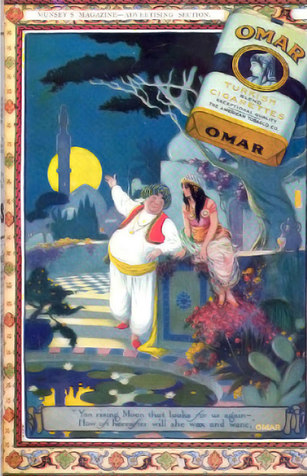
-
 PoeticUniverse
1.7kzEarly Afternoon at the OK Club — Part 2 — Priceless Treasures
PoeticUniverse
1.7kzEarly Afternoon at the OK Club — Part 2 — Priceless Treasures
Amorata Sultana informs me, after having just looked through the ‘Great Omar’, in thanks, that we have to celebrate together once a week until the end of time, so we head out to enjoy a day of Indian Summer:
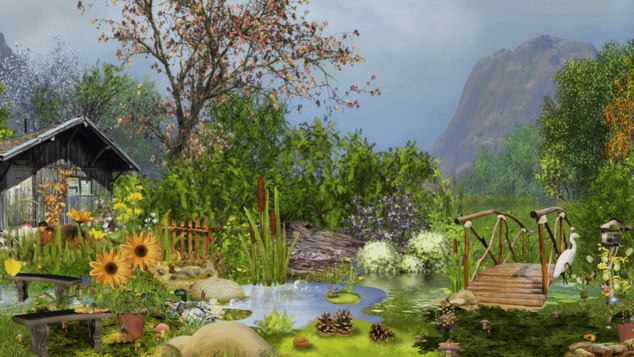
(Click.)
Fall’s blossoms float, showers of fragrant beauty,
As leaves fade while the bulbs store up energy;
Faeries’ floral dreams grant this destiny,
For these leavings enrich earth’s potpourri.
For Ima Beloved, I have two more interpretations:
All’s thanks to Death’s prolonged sifting of ‘dies’,
Of the rest from the best, silly from wise,
The pointless from the pointed—selection.
Oh, through ink-black rivers we had to rise!
Life’s birthright, long signed by time, dust, and death,
Doth also suffice for Earth’s living quests
As their epitaph: RIP; time wears,
The DNA strands’ tips rip; dust is left.
So, what other rooms do we have in the OK Club? There are too many to mention now, plus I make some of them up as I go along; however, we shall get though them all eventually. Readers may request that we tour some of them.
There’s a room for Quatrain Poetry Slams, in which verses get traded back and forth, a room showing The Graveyard of the Gods, A Flower Lore greenhouse, an Elfin Forest, a Spring Fever Meadow, The Library of Babel, containing all the possible books that could ever be written, The End of Hell room, with Charon’s Tale, the Transmogrification of Omar And More story room, a holographic room with a Omar and friends discussing the human condition in an old tavern, the Room of the Future, and a time chamber that thrusts one back into Persian life of 800 years ago.
Another great exhibit is the ‘Collection of Priceless Treasures’, but indeed its content pales in comparison to living a full life.
I fear not death, Heaven, or even Hell,
For death is only life’s natural knell,
And Heaven and Hell are within myself;
The one thing I fear is not living well!
Among the priceless/worthless items:
Aristotle’s ‘lost’ book,
‘Beyond Metaphysics’, and, too,
Some nuggets of gold found
In the original Garden of Eden that was located
In the heart of the Amazon Jungle,
Wherein lie massive fields of Lady’s Slippers
And all of the flowers of Paradise.
There, I reached up—
And put the apple back on the tree.
And the Celtic Chronicles, we have, that were found
In an iron box beneath Glastonbury Abbey,
Revealing all of the tales from the Dark Ages,
And, from the tomb of the Holy Sepulcher—
The Holy Grail itself.
There, as well, a sliver of the true cross,
A small vial containing a drop of the Virgin’s milk,
A pebble, from a moon rock, given to me
By a polymath who works for the President,
A smart thinking and talking cricket named ‘Crick’,
The spear tip that pierced the side of the Saviour,
A few molecules of immortal air
From a sealed pyramid chamber in Egypt,
Some secret papers retrieved from the shaft
Of the bottomless CIA trash pit
Of “things that never happened”,
A thriving rose bush, just outside the window,
That was begun from Omar Khayyàm’s rose garden,
‘Flamberge’—
Prince Valiant’s ‘Singing sword’
(Twin to ‘Excalibur’),
Thomas Jefferson’s briefcase,
An original and intact Ming dynasty vase,
The third [missing] tablet of the 15 Commandments,
And the solution to gravity,
As it is a means and a result
Of quantum collapse from superposition,
As well as a tennis ball with my initials
Marked on it in a yin-yang style.
We also have the ‘treasure’ of a preliminary,
But solid indication of why the Cosmos exists,
Which Lisa Randall was nice enough to give me
From the LHC’s latest analysis.
I’m holding part of a brick that came from
Nero’s very recently discovered revolving banquet hall
That kept pace with the turn of the Earth.
I hold in my other hand a bone from
Early sapiens or of proto-man.
He is not gone, though,
But lives on in your heart and mine,
As in him lived all those before
Through which the universe itself came to life.
Amen.
Yet, all of these treasures pale in comparison…
To nature, living, friends, adventure, romance, and more,
Using Omar Khayyam’s Rubaiyat as a guide. -
 PoeticUniverse
1.7k(1. 9 q1-9)
PoeticUniverse
1.7k(1. 9 q1-9)
9
— The Secret Life of the Rubaiyat Poems —
زندگی راز شعر روبایایات
The secrets which my book of love has bred,
Cannot be told for fear of loss of head;
Since none is fit to learn, or cares to know,
‘Tis better all my thoughts remain unsaid.
There are fatwas against rationalists;
Shariah has become the supreme truth,
Once venerated figures are heretics;
The intellectual sciences are forbidden.
I’m forced to play the game of pretending
To be a good Muslim; even went to Mecca.
Of secrets of the world, my book defined
For fear of malice should not be outlined;
Since none here worthy are amongst the dolts,
I can’t reveal the thoughts that crowd my mind.
Even teaching is prohibited.
Libraries are no longer supported.
It’s safer for one to write on science
And mathematics than philosophy.
My poems are inwardly like snakes who bite
The Shariah and are chains and restraints.
Some I get away with because of the
Poetic mode of expression I have adopted.
‘There is no benefit in the science of medicine,
And no truth lies in the science of geometry,
Logical and natural sciences are heretical
And those practicing them are heathens.’
The promise of reward and punishment
And the quandary of bodily resurrection
Derails one’s attention, diverting it from
The here and now, where one should be focused.
The whole problem is that ‘God’ is not
Established, yet I grant the possibility,
Upgrading the notion to a ‘maybe’;
But they still preach it as a surety!
(1. 9 q10-19)
Ghazzali studied with me for some years
And came to my home in the morning,
‘Fore he could be seen—religiously torn;
So I had a drum beaten on my roof.
Ye do not grasp the truth but still ye grope;
Why waste then life and sit in doubtful hope.
Beware! And hold forever Holy Name
From torpor sane or sot in death will slope.
O Preacher, harder at work we are than you,
Though drunken, we are more sober than you;
The blood of grapes we drink, you that of men,
Be fair, who is more blood-thirsty, we or you?
Some strung the pearls of thought by searching deep,
And told some tales about Him—sold them cheap;
But none has caught a clue to secret realms,
They cast a horoscope and fall asleep.
Had I but over the heavens control
I’d remove this bullish ball beyond the goal
And forthwith furnish better worlds and times
Where love will cling to every freeman’s soul.
I wonder if ‘Lord’ could change the world
Just so that I may see his plans unfurled.
Would he remove my name from roll of call?
Or would my dish with larger sops be hurled?
Since mortal compositions are cast by Hand Divine,
Why then the flaws that throw them out of line?
If formed sublime, why must He shatter them?
If not, to whom should we the fault assign?
From Thee, beloved, those who went astray,
They fall, of course, to dreaming pride, a prey,
Drink the chalice of wine and hear this Truth:
Just empty air is every word they say.
O unenlightened race of human kind
Ye are a nothing, built on empty wind,
Ye a mere nothing, hovering in the abyss:
A void before you, and a void behind.
I saw a wise man who had no regard
For caste or creed, for faith or worldly greed,
And free from truth and quest, from path and goal,
He sat at ease, from Earth and Heaven freed.
(1. 9 q20-29)
Anon! The pious people would advise,
That as we die, we rise up fools or wise.
‘Tis for this cause we keep with lover and wine
For in the end with same we hope to rise.
In Paradise are angels, as men trow
And fountains with pure wine and honey flow.
If these be lawful in the world to come
May I not love the like down here below?
Since neither truth nor certitude is at hand
Do not waste your life in doubt for hither-land.
O let us not refuse the goblet of wine,
For, sober or drunk, in ignorance we stand.
This ruthless Wheel that makes so great a show,
Unravels no one’s knot, shares no one’s woe;
But when it sights a wounded, weary heart,
It hurries on to strike another blow.
And those who show their prayer-rugs are but mules—
Mere hypocrites who use those rugs as tools;
Behind the veil of zealotry they trade,
Trading Islam, worse than heathen are those fools.
If justice ruled the working of the heavens,
All the affairs of Men would prosper well,
If sciences guided all our worldly acts,
Who would be sorry for the men of science.
Serve only the wise if and when you find.
Let fast and prayer blast, you need not mind,
But listen to truth from what Omar Khayyam says:
Drink wine, steal if you must, but be ever kind.
If ye would love, be sober, wise and cool
And keep your mind and senses under rule.
If ye desire your drinking be loved by All;
Injure no person, never act a fool.
Tell me, Omar, of what else you’ve accomplished.
I will, but for now…
Spring’s New Year unfolds the garden’s jewels—
The sweet rose, my Peri, and April Fools.
Yester-now expires gifting the present;
‘Twould be naught to speak outside of what rules. -
 PoeticUniverse
1.7k(1. 10 q1-9)
PoeticUniverse
1.7k(1. 10 q1-9)
10
— Other Works —
کارهای دیگر
Nizam al-Mulk invited me to Isfahan,
To opulent palaces, the imperial court.
I read the rich libraries of the Seljuqs,
Which offered Euclid and many treasures.
I worked on the new calendar for Sanjar,
In an astronomical observatory.
The Sultan wanted the first day as Spring,
So I spread the extra days far and wide.
The Persian New Year of Nowrýz is based
On an actual astronomical criterion,
The sun entering the astronomical sign
Of Aries at the vernal equinox.
This brilliant method guarantees keeping
Nowrýz at the vernal equinox forever.
15 days were added every 62 years,
The length of a year being 365.241935 days,
And for every 5000 years,
The calendar has to be adjusted by one day.
The years 4, 8, 12, 16, 20, 24, 28,
And 33 became leap years of 366 days
With the average year being 365.2424 days.
I wrote several treatises:
Sultan Sanjar had me back to stay at the court.
I worked the division of a quadrant of a circle,
And refuted doubt concerning parallels,
And in algebra related the conic geometry.
On the deception of knowing
The two quantities of gold and silver
In a compound made of the two…
On music theory, of mathematical relationship
Among notes, minor, major, and tetrachords.
Made references to the views of Farabi and Avicenna
To offer a reclassification of musical scales.
(1. 10 q10-21)
A discussion regarding the relationships
Among time, motion, and God,
Which ends with an Avicennian discussion
On incorporeal substances, celestial spheres
And their relationship to angels.
The essence of The Necessary is One
In all aspects and in no case can there
Be multiplicity except in abstraction,
In which case its number can reach infinity.
The essence for which multiplicity
In abstraction is conceived does not become multiple.
All of the attributes of the Necessary Being
Are abstract and none of them contains any existence.
Good Has to Include Evil as its Opposite:
If one were to conduct a good versus evil
‘Cost-benefit analysis,’
The good far exceeds the evil.
The ratio between the goodness that darkness brings
To the evil it causes exceeds that of one to a million,
And in accordance with wisdom in the world,
There is very little evil
That is qualitatively or Quantitatively
Comparable with good.
In my major philosophical work,
On Being and Necessity:
‘Avoiding a great amount of good
Due to the necessity of having little evil
Is itself a great deal of evil.’
Why is there something rather than nothing?
Being is better than non-being,
The very gift of existence is ontologically good
And the world has been created for a good purpose.
The question of ‘being’ and ‘necessity’
Are among the most
Perplexing philosophical questions.
First ontological questions are concerned with
‘What is.’
(1. 10 q22-38)
Second, the question concerning
‘What is it?’
Which pertains to the substance
Or essence of a thing;
Third,
‘Why is it?’
This last question seeks
To determine the cause of a thing.
On the necessity of contradiction in the world,
Determinism and subsistence.
On the relationship between
Existent beings and existence,
The accidental relationship between them
And whether either of them
Exist by their own necessity.
On the knowledge of the universal principles
Of existence the universals of knowledge. -
 PoeticUniverse
1.7kEdward FitzGerald and Omar Khayam — Synergy, Revelation, Investigation, Beauty, and Depth
PoeticUniverse
1.7kEdward FitzGerald and Omar Khayam — Synergy, Revelation, Investigation, Beauty, and Depth
Omar had the deep and grand ideas, but it was FitzGerald as a kindred soul and poet who dressed them in such fine clothes, attracting the world to them forever. The synergy of FitzOmar takes us far and away from the mundane, everyday, low-life, blah-blah, sit-com type renderings into the glorious reaches of deeper thinking about the Big Questions, as well as the good philosophical basic tenet of enjoying life, which I skip over herein, as pretty much known to be obvious.
FitzGerald’s transmogrification of Omar is near unbelievable in its excellence, one of those rare poetic products that could go on for hundreds of years without equal. Shelley was close, in his poem, ‘Adonais’, as well as was Thomas Gray, earlier, in ‘An Elegy Written in a Country Church Yard’.
FitzGerald even discarded some quatrains because they were merely quite masterful instead of meeting the perfectly superb standard he had set for himself.
All things, roll on “impotently”, by Omar. We are, as Shakespeare noted, but actors in a play, strutting and posturing. When were we ever responsible for how we were or are at given moment?
What, without asking, hither hurried whence?
And, without asking, whither hurried hence!
Another and another Cup to drown
The Memory of this Impertinence!
What benefit to life then? I suggest it is Experience, which can be mostly a joy—with Omar’s love, drink, food, friends, adventure, romance, and feeling right up there, although transient, but ever of the glorious Now, and generally free of Shame and Blame, being in the Paradise of right here, plus we being just as organic as anything else in nature, and no more important, “willy-nilly blowing”.
“Round which we Phantom Figures come and go” is about the noumena that our phenomena arise from as a kind of holographic phantasmagorial realm of the “Magic Shadow-show”. What lies behind is difficult to get at, but there has been some progress, at least as to the brain networks.
“The Eternal Saki from that Bowl has pour’d/Millions of Bubbles like us, and will pour” because, well, in short, it has to, all things happening over and over again for all Eternity. It’s deja vu all over again.
“Which, for the Pastime of Eternity,/He doth Himself contrive, enact, behold” and the like is that, if one plays along with the myth, it is like that He thought of, planned, designed, and implemented humans and their nature, with an inherent wide-ranging spectrum of capacity for and from Good to Bad; but, in this myth-take ‘God’ bears no responsibility for His recipe expressing itself in just the way He all-knowingly wanted it to. Why His surprise and disappointment? Brave Omar knocks ‘god’ without fear.
Often, though, big paradoxes mightily arrive when something is made up, and Omar is ever up to the task.
When “You shall be You no more” and “And naked on the Air of Heaven ride”, and the like, it is perhaps that there not really a redundant soul ever living on, made of some invisible angelic vapour that duplicates and preserves you as your brain neuron network (which readily maintains what is already you just fine), in some essence of an already evolutionarily expensively formed brain.
FitzOmar’s ‘quicksilver’ is either as the above or as wine coursing through, it getting mention in the series below.
Would you that spangle of Existence spend
About The Secret--quick about it, Friend!
A Hair perhaps divides the False from True--
And upon what, prithee, may life depend?
A Hair perhaps divides the False and True;
Yes; and a single Alif were the clue--
Could you but find it--to the Treasure-house,
And peradventure to The Master too;
Whose secret Presence through Creation's veins
Running Quicksilver-like eludes your pains;
Taking all shapes from Máh to Máhi and
They change and perish all--but He remains;
A moment guessed--then back behind the Fold
Immerst of Darkness round the Drama roll'd
Which, for the Pastime of Eternity,
He doth Himself contrive, enact, behold.
Omar cites the limits to Knowing Everything as moving one toward a carpe diem centering in the now. He writes “…evermore Came out by the same Door as in I went”, “…But not the Master-knot of Human Fate”, and so forth.
Not being able to know is the same dilemma facing his Impotent Great Wheel that has to do what it does.
And so Omar unveils his basic human philosophy for our human condition, the central tenet being the primacy of the ‘Now’—over “Unborn To-morrow and dead Yesterday”.
The Moving Finger writes; and, having writ,
Moves on: nor all thy Piety nor Wit
Shall lure it back to cancel half a Line,
Nor all thy Tears wash out a Word of it.
While the above probably refers to predestination by Allah, as made more explicit in other quatrains, it can also relate these days to more scientifically modern views as to how each moment arises in Time, in the Now, and then completely passes away, wholly replaced right then and there by the next Now, which process, or even ‘processing’, can’t be stopped, as like the deterministic chain “That none can slip, nor break, nor over-reach”.
What you did long ago is done, dead, and gone, obviating any real shame and blame, but one must as well give up any fame, crediting it to Fate. Plus, indeed, can anyone really be held responsible for who/what they’ve come to be at any given moment from nature and nurture?
While Omar rails against a predestination by ‘God’, it is for other, godless, reasons that determinism might still be much the way events have to be, but for some possible quantum level randomness (which damages the will, anyway, harming it, not helping it at all), as much as we somehow wish to think that our will can be free of itself or that we or any part of physical Nature can do the same to somehow be self-made entities as a mini first cause.
Omar reveals that an ultimate basis without Origin, such as his causeless Great Wheel (standing in for the Eternal Basis), cannot even know its own reason for existence, and is powerless over its state, with no choice given to it for its being, it having to do just what it does and naught else, much as we may also have to admit to.
“It rolls impotently on as Thou or I”, for it just ‘IS’, ever and eternal, without a beginning or end, and what never begins cannot have a certain direction, design, meaning, or purpose put to it in the first place that never was.
Thanks to you both, FitzGerald and Omar, for the fun, as well as for attending to the serious task of pointing out the dubious and the deep. -
 PoeticUniverse
1.7kMaking Game
PoeticUniverse
1.7kMaking Game
We are but chessmen, destined, it is plain,
That great chess player, Heaven, to entertain;
It moves us on life’s chess-board to and fro,
And then in death’s dark box shuts up again.
— Whinefield
Whinefield was one of the more literal translators, although for his quatrain above there was more of a puppet motif in the original Arabic.
There is a chalice made with wit profound,
With tokens of the Maker’s favor crowned;
Yet the world’s Potter takes his masterpiece,
And dashes it to pieces on the ground!
— Whinefield
We have that destiny/time/fate, as Person-like, dressed in the usual mythic scapegoat form of ‘Allah’/‘God’/‘Potter’, although as then believed, creates from clay us puppet playthings for His entertainment on some Great Soap Opera Channel in the sky of Heaven.
‘God’, knowing all, has to write the scripts, obviating any notion of surprise, and then back into dust He dashes us precious stage actors, even though so much depth of design went into making us as chalices filled by Him with the living wine.
Even if we dismiss the paradoxical ‘God Person’ idea as merely hoped for and completely unestablished (and His need for binge viewing of his own plays), the rest of the dilemma still presents itself, for in the real universe, there’s Birth/Death, perhaps since Energy, never still, ever transforms, spreads, and moves on, though not all at once, thankfully, for its doings and undoings are not precipitous but take Time in the slow unwinding of events and of the universe, yet still possibly in the mold of whatever will be will be.
We will soon have a look at Energy’s decay in its quality progressing as constrained by patient Time.
The wings of time are checkered black and white,
As fluttering round the day flies the night.
Like chess pieces we gamely fight for life,
Until into the box we return, quite!
— Austin
FitzGerald suppressed his great quatrain below, it appearing only in the first edition:
But leave the Wise to wrangle, and with me
The Quarrel of the Universe let be:
And, in some corner of the Hubbub couch’d,
Make Game of that which makes as much of Thee.
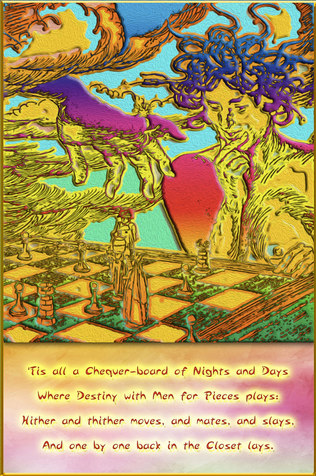
(Sullivan colorized) -
 PoeticUniverse
1.7kDifficult Rhymes
PoeticUniverse
1.7kDifficult Rhymes
Orange
Healthful orange is the common man’s color;
So, to make the expensive look cheaper,
Such as with a hotel, they paint it orange,
And put some shiny polish on the door hinge.
Earth
I notice here a great pittance and dearth
Of words that rhyme with the beloved Earth;
So aside from mirth, how can poems give birth
To all that life on this planet is worth?
Life
I note that just a few words rhyme with ‘life’,
For just how often can you kiss your wife?
Is this why poems are so rife with strife?
It’s better to fife than to stick a knife!
Love
Only a few words rhyme with ‘love’ above,
Like the overflown dove, the heartless shove,
And the ill-fitting glove. Alas, love’s rhymes
Remain unheard of, or aren’t well thought of. -
 PoeticUniverse
1.7kMid Afternoon at the OK Club—Part 1—Old Autumn
PoeticUniverse
1.7kMid Afternoon at the OK Club—Part 1—Old Autumn

Youth and Beauty made agèd Winter mourn
For Summer’s grain—the waving wheat and corn,
For Old Autumn, withered, wan, had passed on,
Leaving the earth a widow, weather worn.
Ice winds stalk the weed flowers,
The ghosts frosting the dead stalks,
Snow crystals barring all that grows.
Winter is life cooled over;
Melting snows feed spring waters.
Scheherazade appears a bit early for our rendezvous, saying, “It’s snowing on the dome over Paradise; come, let’s go in now and see.”
When we return, floating on clouds, we create a film in honor of Old Autumn and the two Jacks, in which also one's older self encounters one’s younger self, and vice-versa:
OLD AUTUMN
The glow-worms, fairy stars come down to ground,
Gleam the shadowy woods through summer’s round;
Then fall’s leaves flutter through the quiet air,
The autumn being the sunset of the year.
The rustling of the trees comes to my ear,
In this, the most mellow time of year.
The harvest brings fulfillment, yearning too,
For autumn is both a smile and a tear.
Each year in October, Jack-in-the-Green
Has a chilled rendezvous with Old Autumn,
Who colors the leaves that Jack made verdant
A season ago. They meet out in the woods,
Although never in the same place, for seasons
Come and go and meet each other as they may.
This year Old Autumn was a little late,
So Jack-in-the-Green sat down on a stump.
Jack pondered his disappearing green youth,
For someday he would have to take Autumn’s place
And perform all of his withering tasks.
A few days later Old Autumn came by;
He gave unto Jack a cheery greeting
And a warm embrace that marked summer’s end.
He gazed fondly at Jack, his younger self,
And saw the vitality that was once his,
And said, “Once I was young; once I was you!”
“I know,” said Jack, “Do you remember how
I refused to believe you, saying ‘no’?”
“Yes,” remembered Old Autumn, “very well,
Like the time I met the Old Man, Winter
On a snowy December day long ago.
He told me that he was my older self—
But I didn’t believe him! Told him off!
“True, I was already feeling my age
But after seeing the old white-haired geezer
I felt young again! Yes, he knew me well.”
“Right,” said Jack, “so I made a little poem:
“When younger, I knew not my elder same,
But when older I told my younger same
That youth must be young; he knew not my name!
It was my younger self who was to blame!”
Swallows twittered in the skies as sprightly
Jack-in-the-Green picked a ripening gourd
And gave it to Old Autumn, who encouraged,
“You won’t have to meet the Old Man until
You take my place, for only I can see him,
After I take down the last of the oak leaves.
“For now, the Old Man sends but his errand boy,
Jack Frost, your twin brother. Hi ho, here he comes!
Aye, young Jack, this is the rarest of days,
For the three of us can be together
But once a year on this bright day / cool night.”
“The Old Man is so lonely, is he not?”
Asked Jack-in-the-Green, “for he sees only you.”
“Yes. Old Man Winter lives cold and alone;
He never sees the fair maidens of spring
Who reinvent the natural world each year.”
There is a chill in the air as Jack Frost arrives
And sings out a greeting: “Hello my brother!
Hello Old Autumn! It’s going to be cold—
Our first frost, but don’t worry too much—
It won’t harm the pumpkins any at all.”
Old Autumn sighed and quick replied: “Good.
Now the rest of the leaves will crack and fall
All the more due to the ice in their veins;
“Yes, they’ll fall like the illusions of youth,
‘Lying carelessly on the granary floor’ and
‘On a half-reaped furrow sound asleep,
Drowsed with the fume of poppies’, as Keats wrote.”
Composing himself, Old Autumn continued:
“And for those of you who think that ‘warm days
Will never cease’, let us ever remember
Dear Johnny Keats, who died so young, at 25;
However, he lived and saw more than some
Of us might hope to do in a lifetime.”
A shiver ran through Jack-in-the-Green,
Hence he said: “It’s cold; I must go now, for
Summer passed away in his sleep last night;
“Autumn, sweet and plump, carries his offspring.
The year dies in the night; ghostly winter looms;
Lo; the flower is already in the seed.”
“Well done, young Jack-in-the-Green; quick, go,
For soon enough comes your autumn of care
Sobering into age, thence into
The pale white winter of death,
“Though not yet your warm indolent summer
Of contentment lazing into middle-age,
But surely past is our crisp,
Flowering youth-spring of joy!
“Such then, comes the end of summer’s dreams,
The blanching of the grassy banks of streams,
But all fragrances my elves remember
Through their long sleep in the winter embers.
“The blossoms fall, showers of fragrant beauty,
As leaves fade, while the bulbs store up energy.
Nature’s floral dreams grant this destiny,
For these leavings enrich earth’s potpourri.
“Flowers lay their heads to sleep in soft beds,
Blanketed by webs of gossamer threads;
My elfin creatures cast their spectral glow,
As winter stars—floral twins—start to grow.
“Later, when surely all the world is dead,
An elf will stand atop Old Winter’s grave
And say, ‘tis not dead’, and by magic bred
Make Snowdrops flower in the tomb’s heat wave.”
Once I, the author, ventured outside at
Four on a dark frosty October morning.
It was so quiet that I could sense the
Cosmos as it played rhythm to my beating heart.
I saw a preview of the winter stars:
Orion, you are so high in the sky—
There for only the astronomer’s eye,
As all those meteors go flying by.
Then I heard a rustling sound in the leaves
Around me—a skunk perhaps—but no,
It was the sound of many falling leaves.
I knew that it must be him, Old Autumn.
He was out there somewhere. Then I sensed him
Going by, for some of the leaves on the
Tree right in front of me broke loose and
Floated away, hitting some other leaves
On the way down, making that rustling sound.
Soon it started up on the next tree, and
Then the next—and so I could very well
Follow the path of Old Autumn making
His rounds in the misty October morn.
Chrysanthemums drank the mellow day,
Falling petals carried the light away.
The weed-flowers grew, marking autumn’s track,
The blossoms that almost brought the spring back,
But winter’s white death wrap was drawn over,
Smothering the earth’s last warm sweet odour.
The autumn fog enswirled, the mist upcurled;
Into nothingness the wisp slow unfurled.
November flew by, a colorless dearth,
And December, amid death, a festive birth.
Youth and Beauty made agèd Winter mourn
For Summer’s grain—the waving wheat and corn,
For Old Autumn, withered, wan, had passed on,
Leaving the earth a widow, weather worn.
Long since have the winds scattered the leaves
Of the trees to make of them a
Burial shroud for the flowers that died
Grieving at summer’s passing. All is death.
The fall is now nearly lost to memory.
Winter is summer’s ungrateful heir,
Squandering his riches and abusing his gifts.
It’s not Old Man Winter’s fault, but his duty.
Summer lies underground now, forgotten,
Silent and crusty, covered by winter’s
Stern mantle. Only April’s tears can make
His grave green again, in the spring-tide.
As seasons pass, the world comes to our door:
Spring sings through the wingèd troubadour;
Summer calls with the rose, ’midst the wood-lore;
Autumn crows, plump and sweet, through frosty hoar.
Joy and exuberance are spring’s largesse.
Sunlight, warmth, and growth are summer’s bequest.
Autumn brings wealth with the mellow harvest.
Winter’s fruit is peace—its bounty is rest.
Past us is the flower of spring’s soft breath;
Though not ended our summer of promise;
Soon enough will come the autumn of care;
Beheld, at last, the dull white shroud of death!
March, April! spring! We’ll reign as we May there,
Between June and her sister, September,
Then prolong the fall, till November come
December, when we can sweet Remember.
In the whisperings of the after-years
The winds of time slowly dry the tears;
Nor would I take back a single drop, for
From those tears the flowers grew without fears.
In spring we rise from the garden at birth.
Summer blooms long with the roses’ fresh mirth.
Autumn creeps in—we wither on the vine.
Last comes winter, when we return to earth.
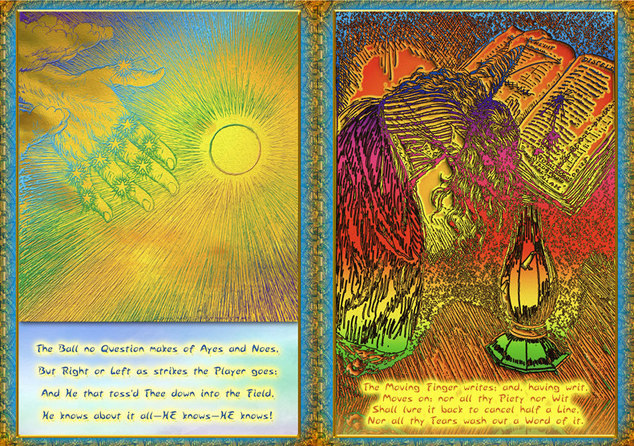
-
 PoeticUniverse
1.7kMid Afternoon at the OK Club—Part 2—On the ‘Now’
PoeticUniverse
1.7kMid Afternoon at the OK Club—Part 2—On the ‘Now’

Ruby Yacht comes over to my table and introduces herself, “Ruby I am, as the color of wine, and I just sailed through the front door.”
“Happy to meet you; have a seat. Is it still snowing?”
“Yes, and it’s sticking, and it’s windy, and getting darker earlier now; but, at least we gained an hour by setting our clocks back.”
The weed flowers came, marking autumn’s track,
The blossoms that almost brought the spring back,
But winter’s white death wrap was drawn over,
Smothering the earth’s last warm sweet odour.
Such then comes the end of summer’s dreams,
The blanching of the grassy banks of streams,
But all fragrances the elves remember
Through their sleep during the winter embers.
“Oh, I’ll set mine back now; that will give us an hour!”
“It’s about time, and speaking of time, what makes for time’s rate of change, anyway?”
“It likely has to with how quickly the smallest monads at the Planck level can change, this rippling upward, which makes for information arriving at the finite speed of light, or less, depending on what else goes through changes higher and higher up, which then informs us, after going through our senses and brains.”
“So, we live behind the times?”
“Yes, slightly behind, from light's finite speed, but more so because the subconscious brain takes from 300-500 milliseconds to to do its neuronal analysis that culminates in conscious qualia as a unified result, along with continuity.”
“So, wow, that's a lot more behind; we live in the past.”
“Yes, it’s like a tape-delayed broadcast of the game of life, but our brains are fairly quick, due to parallel processing by different modules, such as example for vision for color, texture, intensity, direction, edges, semblances to memory objects, cross-associations, and much more.”
“But we still call our present as the ‘now’, as close enough?”
“Sure, as a psychological version of ‘now’, or whatever, it seeming to us what it always did, regardless of our scientific insight.”
“If in traffic we change lanes and pull in just behind a car, it’s lucky that the car is really slightly ahead of where we think it is.”
“Yes, true, but our own car is also slightly ahead of where we think it is. It evens out.”
“And if we switch lanes and pull in just ahead of a car?”
“That’s a bit more dangerous, maybe, but at least our car is really still a bit ahead of where we think it is.”
“I’m a would-be philosopher, Austin.”
“Good, and Omar’s ‘now’ can best be taken as enjoying and savoring the moment, never ignoring it or ruining it by too many mostly needless worries about the future fogging and clouding the present, even the virtual present past that we talked about not withstanding.”
“The other implication is that the universe does us!”
“Yes, you’ve hit on one of the more seemingly unpleasant truths at first, until we realize and accept that things could be no other way. Some people hate that one, regardless.”
“If I look at my watch at any given second, it stands to reason that the longest we’ll have to wait for the seconds digit to change with be one second, but, …”
“Sometimes 1.5 seconds will pass before the digit changes.”
“Aha, you’re up on this!”
“I’ve explored the ‘now’.”
“Wonderful.”
“In our ‘Hall of Now’, only the present tense can be spoken. I’ve been practicing this in all of these Club posts.”
“You did? I mean, you do?”
“Yes, I do."
"That's the longest sentence in the English language!"
"Ha, yes, marriage is not a word; it's a sentence."
"Twenty years to life!"
"A movie about time’s two possible modes is playing in the Hall now, with some Omar quotes at the end; it's called ‘Now Here — No Where’.”
“Ah, both of the same letters in a row. Or could be ‘Every Now — All Where’.”
“Yes, either. For all our science, we still don’t know time’s mode, whether there’s only now, with the past gone and the future not yet, per our intuition, called Presentism, or whether the past, now, and the future all exist right now and always, eternally, per Einstein and Parmenides and their Block Universe, called Eternalism. For all purposes, we're stuck in the present, either way, not being able to jump into the future or the past even if there is a long world-line along which we're traveling through the Block.”
?
There’s naught else but lone, resultant Nows.
No matter how one tries to shake from boughs
The fruits of time’s truth from the Tree of Knows,
Computation has not yet made the morrows.
Welcome to The Philosophy Forum!
Get involved in philosophical discussions about knowledge, truth, language, consciousness, science, politics, religion, logic and mathematics, art, history, and lots more. No ads, no clutter, and very little agreement — just fascinating conversations.
Categories
- Guest category
- Phil. Writing Challenge - June 2025
- The Lounge
- General Philosophy
- Metaphysics & Epistemology
- Philosophy of Mind
- Ethics
- Political Philosophy
- Philosophy of Art
- Logic & Philosophy of Mathematics
- Philosophy of Religion
- Philosophy of Science
- Philosophy of Language
- Interesting Stuff
- Politics and Current Affairs
- Humanities and Social Sciences
- Science and Technology
- Non-English Discussion
- German Discussion
- Spanish Discussion
- Learning Centre
- Resources
- Books and Papers
- Reading groups
- Questions
- Guest Speakers
- David Pearce
- Massimo Pigliucci
- Debates
- Debate Proposals
- Debate Discussion
- Feedback
- Article submissions
- About TPF
- Help
- Other sites we like
- Social media
- Terms of Service
- Sign In
- Created with PlushForums
- © 2026 The Philosophy Forum























